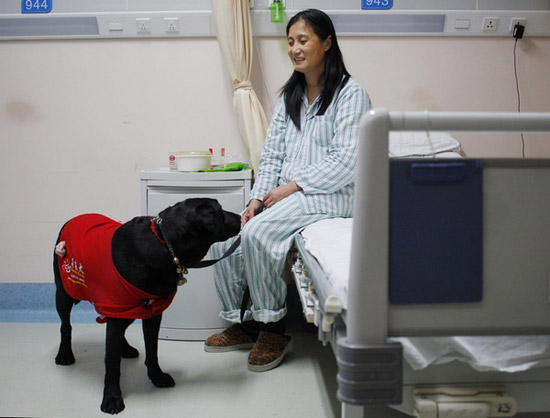
 |
| Guide dog Jiang Quan accompanies his owner Huang Ming in a ward at Shanghai Shibei Hospital on Sunday. (China Daily/ Gao Erqiang) |
Sitting next to the hospital bed, Jiang Quan quietly watches his owner's every move.
Jiang Quan is a 4-year-old black Labrador guide dog. He has spent more than 10 days in a hospital, rarely leaving Huang Ming's side.
"It feels comforting with my dog's company, and he is a good helper," said Huang, who is blind.
The 59-year-old woman has an anaphylactic cough and needs to receive treatment in a hospital. But the ward refused to allow her dog to stay with her.
"Many patients with respiratory problems are allergic to dogs and in this regard it's impossible to have a dog in the ward," said Wang Jin, a doctor in the respiratory department of Shanghai Shibei Hospital.
Considering the blind woman's difficulties, the hospital arranged a special ward for Huang and her dog.
It is the first time a guide dog has been allowed to accompany a patient in a hospital in Shanghai.
"I cannot live without my dog, he is my son and my eyes. I would rather not stay in the hospital than be without him," Huang said. "The hospital gives me great help."
"It is really a short-term solution to a long-term problem. After all, bed resources in hospitals are very limited," said Wang.
"In the long run, a special channel should be established for visually impaired people with guide dogs where they can receive a more considerate service."
Guide dogs are allowed in public places in China thanks to a new regulation passed by China's cabinet, which took effect on Aug 1.
Even so, people with guide dogs still encounter some difficulties in their daily lives.
"Some bus drivers stop farther away from me and my dog, and some even just drive past. When I go shopping, some sellers give me the cold shoulder. Some restaurants also refuse to allow a guide dog to enter," said Huang.
"People often get annoyed seeing dogs, and they complain. But they don't know these guide dogs, they are all Labradors, never bark or bite, they are very gentle," Huang said.
Zhu Wenqi from the Shanghai Guide Dog Association said the public response to the dogs has improved, thanks to ongoing public education.
"At first, people had a negative attitude toward these guide dogs. But now public awareness has improved and they have realized these seeing eye dogs are obedient and behave well," Zhu said.
The Shanghai Disabled-Aid Resource Center operates the website shguidedogs, which was launched on Nov 10, 2011, and provides information about guide dogs.
Since 2007, the center has carried out a guide dog training program in collaboration with a police dog training research institute in Nanjing, capital of Jiangsu province. So far, 18 dogs have been bred and trained. Visually impaired Shanghai residents can apply for a guide dog through its website.
The only other city in China that offers guide dog training is in Dalian, in Liaoning province.
















 Slacklife in Beijing: China's 'No 1 Slackliner'
Slacklife in Beijing: China's 'No 1 Slackliner'


![]()
